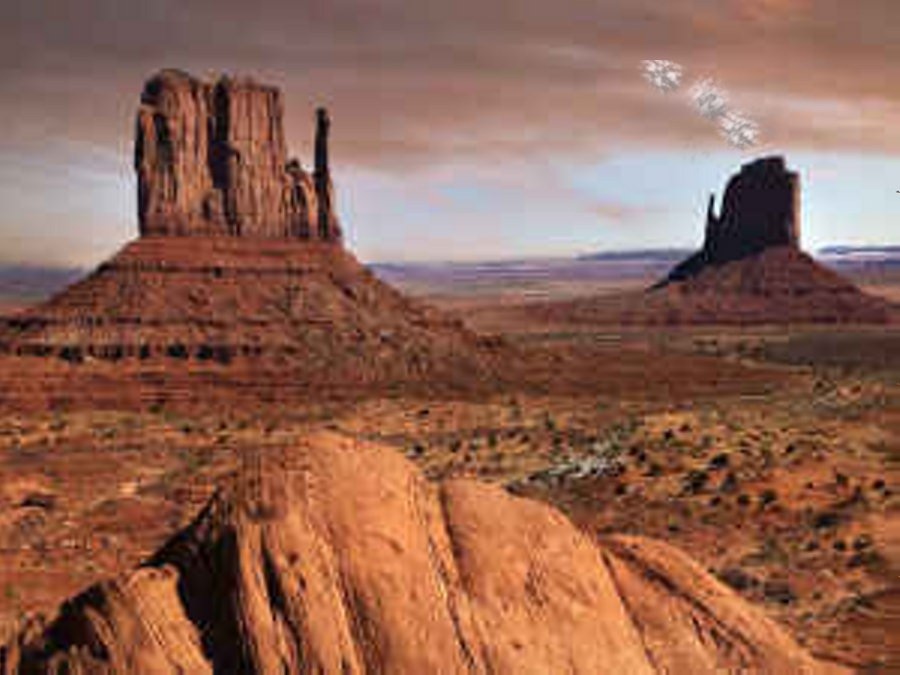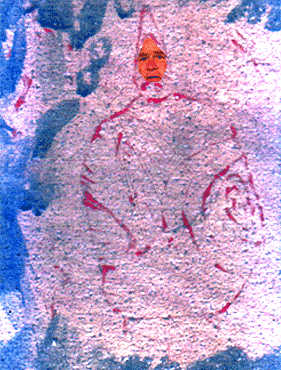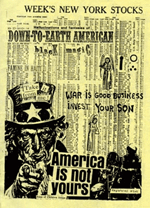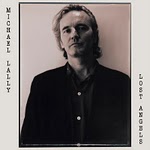IN THE RING
Alan Greenberg’s
ME & MUHAMMAD ALI
Alan Greenberg’s
ME & MUHAMMAD ALI
I follow boxing. Not the sport as much as the anthropological event that each fight is. In August of 1974 I was twenty-three years old, living alone in Manhattan, reading in the Sunday Times about a bout in Zaire between the unbeaten young heavyweight champion, George Foreman, and the aging former champion, Muhammad Ali. It was a promotion of enormous proportions run by a rookie named Don King, and was spectacularly conceived to overshadow the fight itself, the outcome of which was seen as a foregone conclusion. The Olympic gold medalist Foreman was regarded as invincible, a raging beast of suitably monstrous physical proportions, having won all but one of his fights by knockouts of the most brutal sort. Ali, on the other hand, was in decline, having lost to Joe Frazier and Ken Norton. But he was more popular than ever, especially in Africa, and this government-sponsored festival was to be his glorious Last Hurrah.
To me this was alarming. At age ten I had met Ali, then Cassius Clay, in Miami, when he was a rising contender, and like so many fans I was fascinated by his extraordinary mental and physical gifts, and his undeniably wild charisma. Then the courageous stand he made against the U.S. Government in opposition to the Vietnam war ratcheted up the love and admiration bestowed upon him by far more than the boxing community. Even in defeat, his losses seemed somehow redemptive—rising bravely from a crushing knockdown to lose on points to Frazier, then fighting almost a full ten rounds with a severely broken jaw against Norton. However, this rite of passage in Zaire seemed frightful, a sacrificial slaughter of a beloved icon. I even dreamed about it: I saw Ali backed into the ropes and hit with a Foreman blow to the ribs so murderous it made Ali scream. So the Sunday Times piece got me thinking.
I decided that Muhammad Ali needed to see me.
This was urgent. I gathered my cameras and tripod, borrowed a Toyota from a neighbor upstairs, and headed west. Three hundred miles later I reached Deer Lake, Pennsylvania, near Amish country, and soon found a cluster of log cabins that was Muhammad Ali’s training camp. The champ’s assistant, Gene Kilroy, told me that Ali was on the road promoting the fight; since he was scared of flying, later round midnight he would arrive home by bus and head straight to bed. I grabbed dinner in town, then returned to the camp after ten o’clock and waited near the driveway for Ali. Precisely at midnight a Greyhound-like bus arrived with its lighted signboard reading “Fooling Around”, and with Muhammad Ali at the wheel.
With my bagged tripod slung rifle-like from a shoulder, looking like a pug-loving Mark David Chapman, I stepped from the shadows to the open door of the bus. Wearily Ali stood up and stared down at me. I introduced myself and handed him a letter that a friend, who worked at Paramount Pictures, had asked me to give him. Instead of taking the stranger’s letter and excusing himself, the massive man graciously sat down on the steps and carefully read it. Then he read it again. But now, to my dismay, once he looked up, something seemed to be wrong—the great Ali was angry.
“I ain’t no dog that jumps at a bone,” he said softly.
Immediately I explained to him that I had nothing to do with the letter except deliver it to him sealed. And coming from Paramount Pictures, I presumed I was also doing Ali a favor. But I was wrong. Like a slavemaster talking down to his boy, a Paramount executive had written to Ali that the company had chosen to cast the handsome boxer in the lead role of its upcoming production, “Mandingo”, based on a book best described as a pit of racist trash. The mogul told Ali—told him, not asked—to call his office as soon as possible. Shaking his head, the proud Muslim sat on the steps of his bus and quietly discussed four hundred years of African-American history with me, speaking reasonably, often eloquently. After more than an hour of this I apologized on behalf of my friend at Paramount, suggested that maybe some day I’d return with my cameras, wished him luck against Foreman and got back into my borrowed car. As I was about to turn the ignition key, a huge heavily-muscled hand grabbed my bony shoulder.
“Don’t go,” Ali muttered. “You’re different.”
He and his wife Belinda put me up, and early the next morning I waited as instructed by Ali for him to finish his roadwork. He showed up in grey sweats and combat boots and sat on a pile of firewood, motioning me to join him as Kilroy handed Ali several pages of publicity material for the fight. He pored over page after page as I focused my camera on him, waiting for him to look up. He paused to read and reread a particular page with eyes widening, then finally he raised his head, his face a mask of relief.
“I’m as big as he is,” he uttered wondrously, realizing for the first time that he was the same size as the mythically gargantuan Foreman. Up to this moment The Greatest, The Louisville Lip, the man who made bragging and taunting into performance art and naïve literature, hadn’t thought he stood a chance to win.
“I can beat this guy,” he whispered with conviction. Ali gazed into me, searching for something.
I took his photograph.



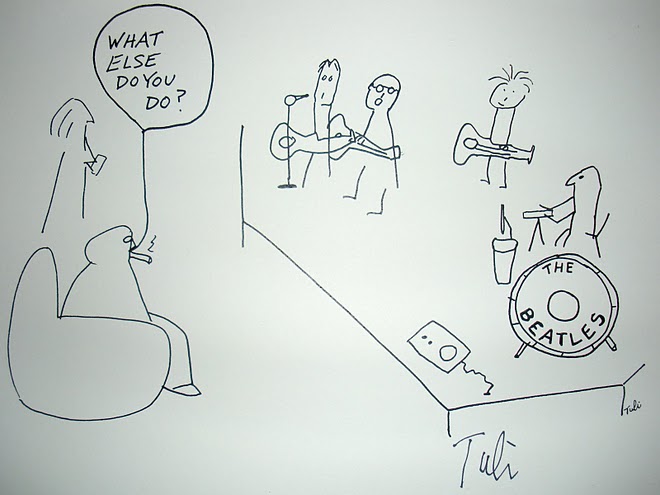
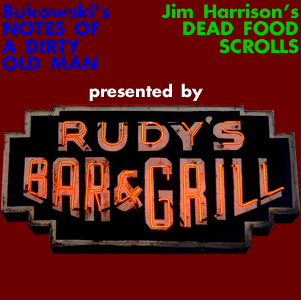
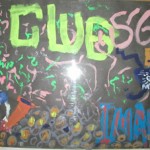
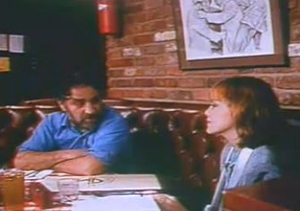
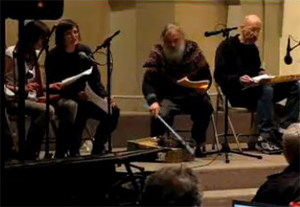
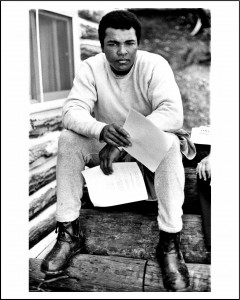 Boxing Editor, Alan Greenberg is a writer-photographer-screenwriter-filmmaker, whose work includes HEART OF GLASS (which Rolling Stone called “The best book on the making of a film ever written”), LAND OF LOOK BEHIND (an award winning documentary centered around Rastafarian culture in Jamaica during Bob Marley’s funeral) and LOVE IN VAIN (the story of legendary king of the Delta bluesmen Robert Johnson, which was the first unproduced screenplay ever published by a major house as literature. In the near future Smoke Signals, will premier his long hidden feature film, the dark comedy, LIVING DREAMS.
Boxing Editor, Alan Greenberg is a writer-photographer-screenwriter-filmmaker, whose work includes HEART OF GLASS (which Rolling Stone called “The best book on the making of a film ever written”), LAND OF LOOK BEHIND (an award winning documentary centered around Rastafarian culture in Jamaica during Bob Marley’s funeral) and LOVE IN VAIN (the story of legendary king of the Delta bluesmen Robert Johnson, which was the first unproduced screenplay ever published by a major house as literature. In the near future Smoke Signals, will premier his long hidden feature film, the dark comedy, LIVING DREAMS.